Suchergebnisse für "Factsheet: Energietechnologien gestalten, die für alle sinnvoll und nutzbar sind"
PersonAI - User-Centered AI-based energy services built on personal preference models
Conduct a large-scale, long-term study with 40-50 people to create personal comfort profiles to increase comfort in buildings. The personal comfort profiles will then be fed back into the building control system as input variables in a proof-of-concept.
INN'FIT4UM - Innsbruck "Fit4UrbanMission" - climate neutral Innsbruck 2030
Cities are the place where decarbonization strategies for energy, transport and buildings intersect. A few years ago, the municipality of Innsbruck set up a Smart City Group consisting of staff from the municipality, IIG, IKB and IVB to address this challenge. The goal of INN'F4UM is to develop a step-by-step plan to achieve climate neutrality for the city by 2030, building on an up-to-date representation of energy and resource flows together with the University of Innsbruck.
City of Tomorrow
City of Tomorrow puts emphasis on the built infrastructure in connection with urban energy systems, both on a district-level and within the wider agglomeration (suburban areas).
Reallabor Weizplus - Reallabor climate-neutral region Weizplus
Clarification of relevant questions for the potential establishment of a real lab in the region of Weizplus, which aims at a 100% supply of the region with renewable energies by 2030. The content-related technological focus of the activities of the future real lab is on all energy-relevant sectors (heating, electricity, cooling) applied to the focal points of energy efficiency and replacement of fossil energy in buildings, in trade and industry as well as mobility.
DIM4Energy - Digital Information Models for the Planning and Optimization of Buildings and Urban Energy Infrastructure
Digital information models (DIM) are playing an increasingly important role in urban planning and decision-making processes, from individual buildings (BIM) to urban information models (UIM). For the planning and optimal operation of plus-energy neighborhoods, valuable information could be obtained from these existing models, provided the appropriate data sources and associated software tools are properly linked.
CO2 neuBau - The CO2-neutral Construction Site: a Contribution to the Climate Protection by the Austrian Construction Industry
Identification of all direct and indirect CO2, respectively, GHG emissions generated at construction sites. Analysis of the framework conditions and technologies towards demonstrating the options for their control. In parallel, added values, such as cost-benefit advantages of a CO2-neutral construction site, were outlined and quantified.
F4WM - Fit4WienerMission
Preparation for the EU Urban Mission by updating goals and strategies (Smart City Wien Framework strategy, Climate-Roadmap), developing a manual for climate-neutral Viennese neighbourhoods and concepts for the participation of citizens (Climate Citizens' Council) and businesses (Climate Agreements), as well as a city-internal capacity and structural planning.
EM Städte - Monitoring and evaluation of urban energy flows
In the first phase of the project, the data source of the energy statistics will be analyzed. Based on the findings of the analysis a methodology on build up regional energy balances will be developed. The methodology will be integrated into the Senflusk tool and tested on five reference cities in Austria.
FiTNeS - Facade integrated modular Split-heat pump for new buildings and refurbishment
The goal of FitNeS was the development of modular split heat pumps with compact and silent façade-integrated outdoor units for heating and domestic hot water preparation (and optionally cooling in combination with PV). The outstanding features of the concept are a modular design with a high degree of prefabrication and representing a visually and architectonically attractive, economic and sustainable solution for both new constructions and renovations. One of the main development goals is the minimization of sound emissions by means of optimized flow control.
South Burgenland Innovation Cluster
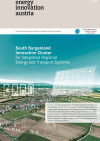
South Burgenland Innovation Cluster for Integrated Regional Energy and Transport Systems
energy innovation austria
1/2019
Herausgeber: BMVIT und Klima- und Energiefonds
Mehrsprachig, 8 Seiten
Downloads zur Publikation
CoolAIR - Predictive control of natural nighttime ventilation and daylight-optimized shading for passive building cooling
Natural nighttime ventilation and daylight-optimized shadowing are high potential approaches to efficiently and economical cool buildings. Nevertheless, the full potential cannot be acquired, since, if at all, such behavior is manually initiated by users. Goal of this project is the development of an automated, self-learning system that can assess the full cooling capabilities and establish an alternative to conventional air conditioning systems.
Innovations for cool urban oases
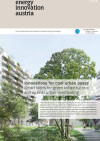
Smart ideas for green infrastructure and against urban overheating
energy innovation austria
3/2018
Herausgeber: BMVIT und Klima- und Energiefonds
Englisch, 8 Seiten
Downloads zur Publikation
Digitization in the construction industry
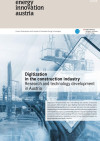
Research and technology development in Austria
energy innovation austria
4/2018
Herausgeber: BMVIT und Klima- und Energiefonds
Englisch, 8 Seiten
Downloads zur Publikation
KlimaStadtLinz2030: Linz and its path to climate neutrality by 2030 - Preparation for the EU - Mission “100 Climate-neutral Cities by 2030”
The research project investigates whether and how it is possible for the city of Linz to achieve climate neutrality by 2030 within its own sphere of influence. A common vision, which is being developed with the citizens in a participatory manner, unites the opportunities that arise for the city through the measures necessary for this goal.
Innovations for the city of tomorrow
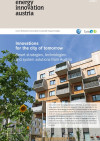
Smart strategies, technologies and system solutions from Austria
energy innovation austria
4/2016
Herausgeber: BMVIT und Klima- und Energiefonds
Englisch, 16 Seiten
Downloads zur Publikation
M-DAB2: Material intensity of inner development - resource assessment and localization of urban development potentials
For the first time, the material intensity of inner development (in terms of material quantities) for different design variants is to be considered in the evaluation of inner development potentials. A set of methods for the holistic evaluation of potential areas and different development variants and scenarios for resource-saving inner development will be created.
Cities as innovation drivers
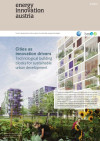
Technological building blocks for sustainable urban development
energy innovation austria
4/2013
Herausgeber: BMVIT, Klima- und Energiefonds
Englisch, 8 Seiten
Downloads zur Publikation
Energy-Sponge: The Building as an Energy-Sponge - Electricity In - Heat Out
Innovative, dynamic control concepts had been developed which enable (air) heat pumps in combination with PV- or renewable grid electricity to use the building mass of a multi-familiy house as heat storage. User acceptance had been evaluated and possible business models had been developed.
CityCalc - Calculation Tool for Energy-Efficiency in Urban Planning
To assess the energy performance of urban planning projects in early design stages with low input and evaluation effort within the project CityCalc, an easily applicable planning and evaluation tool has been developed.
Energy-storage concrete: Thermal Component Activation

This planning guide provides information on the option of solely heating and cooling small-volume residential buildings by means of thermal component activation (TCA). Concrete instructions on the planning of residential buildings with thermally-activated ceilings are also provided.
Felix Friembichler, Simon Handler, Klaus Krec, Harald Kuster
Herausgeber: BMVIT
Englisch, 122 Seiten
